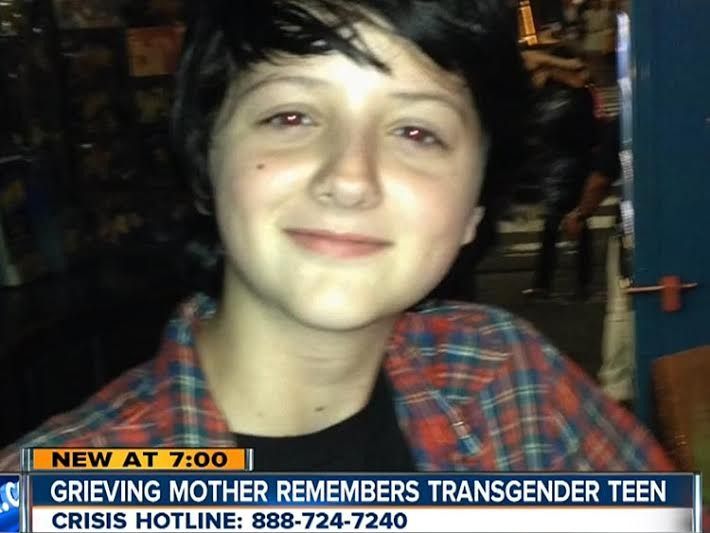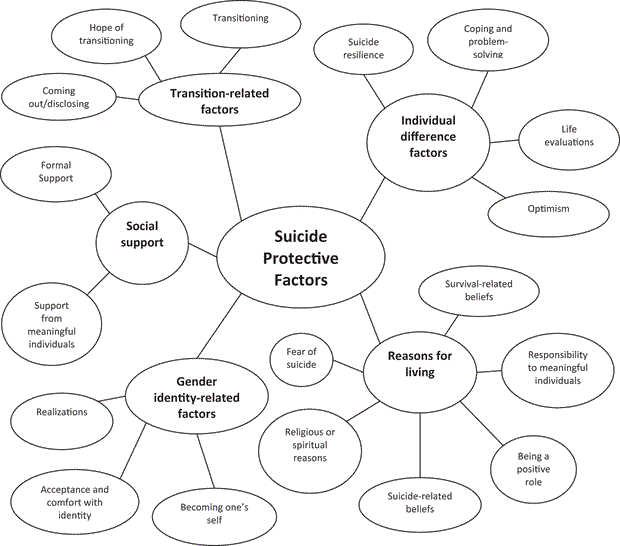How to keep trans people alive
Of course the first part of this is...or should be...quite obvious. How about people stop murdering trans women of color?
It's time to do more than just solve each homicide as they happen. It's time to do more than just arrest these horrific people who commit these violent crimes. It's time to do the work beforehand.
--Nellie Fitzpatrick, mayor's liaison to the LGBT community in Philadelphia
It is not enough to light candles.
--Suffok, MA, District Attorney DanConley
Of course being murdered is only one of the leading causes of our demise. Another one is suicide.
 Fourteen-year-old Emmet Castle took his life in San Diego last Saturday. He was the fourth San Diego area trans teen to take his own life this year, joining Sage, Taylor Alesana and Kyler Prescott.
Fourteen-year-old Emmet Castle took his life in San Diego last Saturday. He was the fourth San Diego area trans teen to take his own life this year, joining Sage, Taylor Alesana and Kyler Prescott.
A new study has been released that examines the factors that protect transgender adults from attempting suicide. “Without This, I Would for Sure Already Be Dead”: A Qualitative Inquiry Regarding Suicide Protective Factors Among Trans Adults was written by Chérie Moody and Sandra Peláez from McGill University, Nate Fuks from The Argyle Institute of Human Relations in Montreal, Canada and Nathan Grant Smith of the University of Houston College of Education.
The researchers found 133 transgender and/or gender nonconforming individuals living in Canada, to respond to an online anonymous survey about their thoughts on and attempts at suicide. The participants ranged in age from 18 to 75. Nearly 45% of respondents said they had a suicide plan at least once in their lives, while 26% indicated that they had attempted suicide at least once. The majority of participants indicated they had experienced suicidal thoughts.
Identifying factors that protect transgender people from suicide is critical. Our research showed that social support, self-acceptance, and access to health care that affirms their gender identity, among other factors, were all protective against suicidality.
--Smith
Five themes emerged from their responses and were categorized as protective factors. Those were social support, from friends, family and healthcare professionals; gender identity-related factors, such as self-acceptance; transition-related factors, such as being able to live in accordance with their gender identity; individual-related factors, such as optimism and problem-solving skills; and reasons for living, such as the desire to be a role model to others.
For example, feelings of acceptance and being valued were a life-saving aspect of their social support. Disclosing their gender identity along with the hope of being able to openly express their gender identity decreased suicidal thoughts and attempts, and being a role model for other trans individuals all served to protect them from suicidality.
--Smith
Smith and his colleagues said their findings are important because there has been little research on suicide protective factors in transgender adults. Organizations and practitioners who work with this population can use the information to develop specific prevention programs and mental health support for suicidal transgender individuals.
Our research underscores the important role that healthcare providers play in the health of transgender persons. Professionals should adopt a harm-reduction, client-centered approach and view transition-related care as an important part of suicide prevention.
--Smith
Several suicide protective factors emerged in the current study. First, participants reported seeking and receiving different kinds of social support, which can be grouped into formal social support (mental health practitioners, community resources, support groups, crisis lines) and informal social support (friends, partners, family members). This finding is in line with the previous literature that shows that family connectedness can be an important suicide protective factor among LGB youth (Eisenberg & Resnick, 2006) and that social support from family is an important suicide protective factor among trans adults (Moody & Smith, 2013) and trans youth (Travers et al., 2012). Although these findings support previous research, they also expand our understanding of how social support as a suicide protective factor is experienced by trans individuals. Specifically, the feelings of acceptance and being valued, reported by many participants, were a life-saving aspect of social support. This finding extends the findings of recent studies demonstrating that individuals who are accepted and supported in their gender identity show better mental health and quality of life outcomes (e.g., Murad et al., 2010; Pinto, Melendez, & Spector, 2008), and that social support is important in a variety of ways for genderqueer individuals’ well-being (Budge, Rossman, & Howard, 2014). It also extends previous findings regarding the healing and emotionally protective aspect of acceptance and support from families of origin (Singh & McKleroy, 2011).

Such support is not what they had in mind at the Association of Certified Biblical Counselors conference which began on Monday.
A day-long ACBC preconference held Monday on transgender issues demonstrated just how harmful their beliefs still are. Like some of the messaging shared at last year’s ERLC conference, Southern Baptist leaders still reject “transgenderism” as a disorder that can be fixed through faith in Christ — similarly always referring to trans people as “struggling” and “distressed.” Denny Burk, the SBC’s chief opponent of trans equality, claimed “the grace of Jesus is sufficient” to address gender identity conflict. Trans people should “reshape their thinking to conform to the word of God,” he said during his keynote Monday.
Addressing a question about if a child insists on embracing their transgender identity, James Hamilton, a professor of biblical theology at SBTS, answered that parents have no responsibility for continuing to support them. It’s the transgender child, he insisted, who severed the relationship with their family. Mohler similarly suggested that it’s polite to respect the name and gender transgender strangers may use when introducing themselves, but that doesn’t mean parents should respect the name and gender their own children assert. “No,” he asserted, there is never a justifiable reason to affirm transgender kids’ “confusion.” These things aren’t “negotiable,” he said.
Owen Strachan, a professor at Midwestern Baptist Theological Seminary, spoke at length about the importance of imposing gender norms on children. “We need to steer them, we need to coach them,” he explained. He also reinforced conservative fears that transgender people are somehow dangerous to others. Noting that some states have protections against discrimination on the basis of gender identity, including in schools, he opined, “My little girl can be in a restroom and a transitioning child can go in there with her.” He didn’t say what would happen then, but his insinuation was that his daughter would somehow be at risk.
--Zack Ford, Think Progress
"Steering" and "coaching" by so-called "biblical counsellors" is supposed to replace the reparative therapy model, I guess. But it is all still "Pray the trans away."
It is dangerous...even lethal.
It is not behavior calculated to help us stay alive.


Comments
Stand up for and support transfolk.
That has proven anti-death benefits.
Thanks, Robyn.
That, in its essence, is fascism--ownership of government by an individual, by a group, or by any other controlling private power. -- Franklin D. Roosevelt --